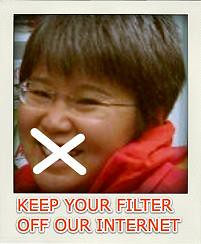Why on earth does Senator Stephen Conroy think that filtering the content via Australian Internet Service Providers is a good idea? The plan is to block material deemed unsuitable for children, and for adults. This is wrong on so many levels. For one thing, filters are never going to be 100% effective, and for another, who is going to decide what is unsuitable for adults? I didn’t realise we were living in a dictatorship!
Richard Giles puts the arguments against the filter very well. See also Kathryn’s post, pointing to Mark Newton’s letter.
There’s been a lot of chatter on Twitter about this issue all day. Some of us are displaying our opposition to this via our avatars. Thanks, @bronwen for mine! 🙂
Sign this petition. Write to the Senator, or your local MP.
This raises a few issues for me. I’m sure the government perceives that there to be some political mileage to be gained from this sort of action. They must think there are enough parents out there who will think this is a good idea, and that their children will be safer if this filter is put in place. It makes me wonder what librarians and teachers could be doing to help parents understand The Internet, and to help children be safer online. As Will Richardson points out:
” If you want kids to be educated about these tools and environments, then maybe we should, um, educate them.” (Read his entire post, about his conversation with a school principal.)
New dad Tama Leaver has this to say:
And for me, as I watch my 8-day old son sleeping in his pram next to me, I’m certain I want his early experiences of the internet to be ones with his parents. We’ll help him make informed choices about what to see, and we’ll help him learn the critical skills to evaluate and understand the information out there – good and bad. We won’t try and tell him everything he needs to know is inside this safe, filtered, contained black box or walled off internet, because if we start down that path where would it really end? Don’t get me wrong, there’s a lot of things I hope my son doesn’t see during his childhood, but I want to help him choose to avoid certain things, I don’t want him living in a country that takes those choices away even from his parents!
It’s an ongoing process, and not something you can expect children to learn overnight – literacy as a whole cannot be learned in one or two simple sessions. Sure, it won’t take you years and years to learn to read, but it takes a while to become good at it, and to understand and interpret the different registers you’re reading in, and how to understand all the cultural nuances. (If you’ve forgotten how long it took you to get good at reading a novel, for example, go and start learning another language, then try and pick up a popular novel in that language, and you’ll soon remember how hard it is.)
I think we’re living in very interesting times, with many of us still not very adept at negotiating the online world and understanding how to read it, interpret it, and manipulate it (I won’t go into the whole digital native, digital immigrant thing here). We librarians should definitely be taking a more active role in guiding people through this new information environment. We’ve been doing it for centuries, with the print realm. Are we ready to do this in the online world?

4 Comments
*bangs head against wall* why?! why?! why?!
Coming from a country that has already passed several bills that take us closer to a “nanny state” it makes me cross to see it happening over the ditch. Citizens speak up!
Thank you for making me get off my but and blog about this latest govt craze http://teenageresearch.wordpress.com/2008/10/30/filtering/ i read on the comments of an ABC news story that someone said the offline majority should not be telling the online minority what to do. but its the offline majority who are scared of the internet and don’t know how to deal with its problematic aspects.
I know, Penny, isn’t it sad?
Thanks for stopping by, Clare. Great point: “the offline majority should not be telling the online minority what to do”. Hear, hear!
thank you